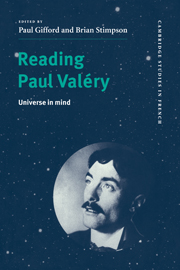Book contents
- Frontmatter
- Contents
- Contributors
- Abbreviations
- Introduction
- PART 1 SELF-SCIENCE
- PART 2 SELF-WRITINGS
- 6 The poetics of practice and theory
- 7 ‘Esprit, Attente pure, éternel suspens …’: Valéry's prose poetry
- 8 Counter-fiction
- 9 The Dialogues and Mon Faust: the inner politics of thought
- 10 Major poems: the voice of the subject
- 11 Other voices: intertextuality and the art of pure poetry
- 12 Manuscript steps: ‘Les Pas’
- PART 3 BODY, MIND, WORLD
- Conclusion
- Bibliography
- Index
- Cambridge Cultural Social Studies
8 - Counter-fiction
Published online by Cambridge University Press: 04 August 2010
- Frontmatter
- Contents
- Contributors
- Abbreviations
- Introduction
- PART 1 SELF-SCIENCE
- PART 2 SELF-WRITINGS
- 6 The poetics of practice and theory
- 7 ‘Esprit, Attente pure, éternel suspens …’: Valéry's prose poetry
- 8 Counter-fiction
- 9 The Dialogues and Mon Faust: the inner politics of thought
- 10 Major poems: the voice of the subject
- 11 Other voices: intertextuality and the art of pure poetry
- 12 Manuscript steps: ‘Les Pas’
- PART 3 BODY, MIND, WORLD
- Conclusion
- Bibliography
- Index
- Cambridge Cultural Social Studies
Summary
Valéry's aversion to the novel is legendary, from his mocking of the paradigmatic arbitrariness of narrative in ‘la marquise sortit à 5h’ (‘the marchioness went out at 5 o'clock’), his reservations on Flaubert and Proust, his sometimes acerbic remarks on Gide's work, to the manifest absence of the genre in an œuvre which nevertheless encompasses effortlessly and unproblematically poetry, drama, dialogue, essay, prose poetry, aphorism and libretto. Yet, from the Conte vraisemblable of 1888 and the prose narratives of the Teste cycle right up to to the posthumous publication of the Histoires brisées, he displays a continuous interest in experimental forms of prose fiction that quite belies this public stance. Throughout the Cahiers, too, Valéry delights in sketching out micro-stories, or ‘sujets’: accounts of dreams, fragments of dialogue, computations of relationships between X, Y and Z, mini-scenarios which play out one moment of an ‘abstract tale’, one set of variations in the continually evolving dialogue between mind and body. There emerges a fascination with exploring the different possibilities of fictional prose from the earliest moments of the Cahiers through the next fifty years; so much so that the voice of the writing ‘I’ which finds expression in various forms of counter-fiction is as persistent – and arguably both more continuous and more subversive – than the poetic voice.
- Type
- Chapter
- Information
- Reading Paul ValéryUniverse in Mind, pp. 138 - 154Publisher: Cambridge University PressPrint publication year: 1999
- 1
- Cited by

